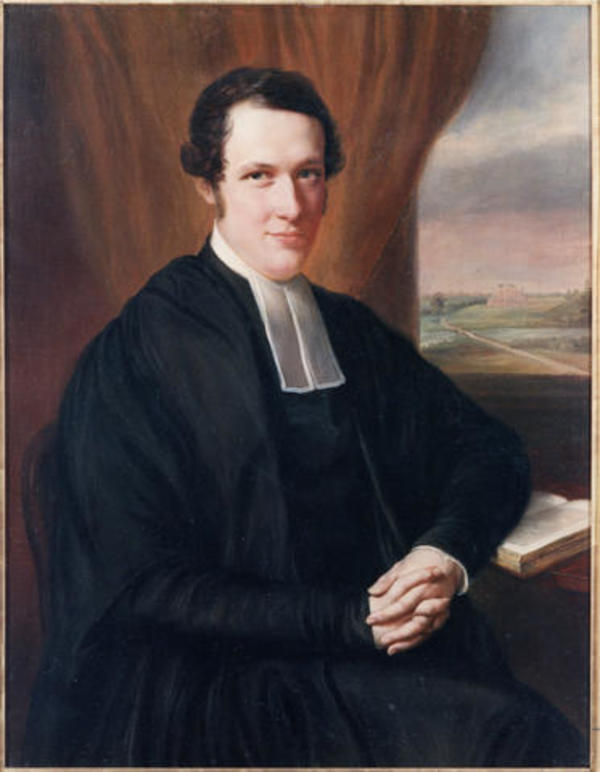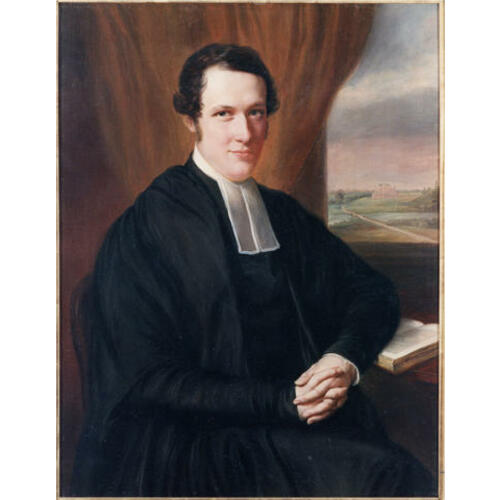
Source: Link
NICOLLS, JASPER HUME, Anglican clergyman and educator; b. 17 Oct. 1818 on the island of Guernsey, son of General Gustavus Nicolls and Heriot Frances Thomson; d. at Lennoxville, Que., 8 Aug. 1877.
Jasper Hume Nicolls spent a good deal of his early life in British North America where his father was Commanding Royal Engineer successively in Halifax and Quebec. He was educated at Oriel College, Oxford (ba 1840), and was made a fellow of Queen’s College, Oxford, in 1843. He was ordained deacon in 1844 and priest in 1845. In 1845 Nicolls returned to Canada to become the first principal of Bishop’s College, Lennoxville, incorporated in 1843 and about to open. Bishop George Jehoshaphat Mountain*, the president of Bishop’s and Nicolls’ uncle by marriage, was responsible for Nicolls’ appointment, and from 1845 until Mountain’s death in 1863, Nicolls had the benefit of his counsel and support.
For 32 years Nicolls successfully directed Bishop’s as a liberal arts college and Anglican divinity school. He saw Bishop’s as an institution that would provide clergy for the Church of England in Canada and would offer to the country at large a sound and liberal education upon reasonable terms. The institution was to be under Anglican control but open to students of all denominations. In his convocation address at Bishop’s in 1860 Nicolls asserted, “We are not ashamed of being what is termed denominational; but we open our doors to all; we have no test on admission; we have no test in granting degrees.” He developed a curriculum similar to that in other Anglican colleges in Canada, which consisted of instruction mainly in the classics, mathematics, and divinity.
Influenced by the Tractarian movement during his Oxford career, Nicolls remained throughout his life a high churchman. He showed his Tractarian sympathies in 1845 when William George Ward, an associate of John Henry Newman, was tried by the Oxford University convocation for making an extreme Tractarian statement and was degraded from his degrees. Nicolls, a member of convocation, supported Ward. Nicolls’ churchmanship helps to explain his relations with other Church of England bishops in Canada. He got on well with Francis Fulford*, the bishop of Montreal, who was a high churchman, and badly with Fulford’s successor, Ashton Oxenden*, who was sympathetic to the Anglican evangelicals. Politically Nicolls was a Conservative; he strongly favoured English influences in Canada and was much opposed to American ideas and institutions,. Like Bishop Mountain, Nicolls was prepared to work with either Conservative or Reform politicians provided they were willing to advance the: interests of Bishop’s College. Thus he enlisted the; good offices of adherents of the Liberal-Conservative party such as Alexander Tilloch Galt* and. Timothy Lee Terrill, the mla for Stanstead, but: also Reformers such as Thomas Cushing Aylwin and Antoine-Aimé Dorion*. In 1852 Nicolls made; strong representations to Lord Elgin [Bruce*] and. the Reformist administration of Francis Hincks* and Augustin-Norbert Morin* in his successful effort to secure a royal charter for Bishop’s.
Nicolls was a strong believer in the principle: that Christian thought should occupy a central position in education at all levels. In his convocation address at Bishop’s in 1860, he said, “Let it be the University’s privilege to demonstrate that – while man discovers, he discovers what God has made, what God gives him to understand. Universities let us remember are Christian Institutions.” Nicolls was prepared to accept state supervision of secondary schools, but thought that the curriculum should contain religious instruction of a non-sectarian type.
Jasper Hume Nicolls was a man of fine character: sincere, straightforward, witty, with a fine sense of humour and great personal charm. In 1847 he had married his first cousin, Harriet Mary, daughter of Bishop Mountain; they had two sons and one daughter.
J. H. Nicolls, An address delivered before the convocation of Bishop’s College, Lennoxville, June 27, 1860 (Sherbrooke, Que., 1860); An address to the teachers of academies in the district of Bedford . . . on the occasion of the formation of a teacher’s association, October 29, 1858 (Burlington, Vt.,1859); The end and object of education, a lecture (Montreal, 1857); J. H. Nicolls and John Carry, Essay on the subject of the restoration of the diaconate . . . (Montreal, 1863).
Bassett Memorial Library, Bishop’s University (Lennoxville, Que.), Nicolls papers. Clerical guide and churchman’s directory, an annual register for the clergy and laity of the Anglican Church in British North America, 1876, ed. C. V. F. Bliss (Ottawa, 1876). D. C. Masters, Bishop’s University, the first hundred years (Toronto, 1950), 3–63; Protestant church colleges in Canada; a history (Studies in the History of Higher Education in Canada, 4, Toronto, 1966), 4–5, 8, 15, 65–66, 211; “Bishop’s University and the ecclesiastical controversies of the nineteenth century (1845–1878),” CHA, Report, 1951, 36–42; “The Nicolls papers; a study in Anglican Toryism,” CHA, Report, 1945, 42–48.
Cite This Article
D. C. Masters, “NICOLLS, JASPER HUME,” in Dictionary of Canadian Biography, vol. 10, University of Toronto/Université Laval, 2003–, accessed June 23, 2025, https://www.biographi.ca/en/bio/nicolls_jasper_hume_10E.html.
The citation above shows the format for footnotes and endnotes according to the Chicago manual of style (16th edition). Information to be used in other citation formats:
| Permalink: | https://www.biographi.ca/en/bio/nicolls_jasper_hume_10E.html |
| Author of Article: | D. C. Masters |
| Title of Article: | NICOLLS, JASPER HUME |
| Publication Name: | Dictionary of Canadian Biography, vol. 10 |
| Publisher: | University of Toronto/Université Laval |
| Year of revision: | 1972 |
| Access Date: | June 23, 2025 |



